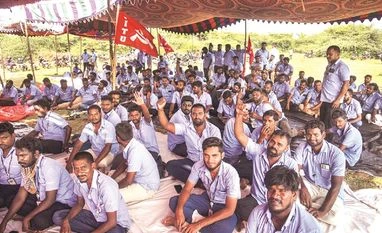28 days on, no end in sight to strike at Samsung's Sriperumbudur plant
Sources aware of the talks among the state government, employees, and the company blame Citu, which is leading the protests, for the impasse
)
Explore Business Standard
Sources aware of the talks among the state government, employees, and the company blame Citu, which is leading the protests, for the impasse
)
Tightrope Walk
Citu claims Samsung workers in Seoul receive Rs 4.5-6 lakh in wages and salaries per month, while their Indian counterparts work for a meager Rs 20,000-25,000
Already subscribed? Log in
Subscribe to read the full story →

3 Months
₹300/Month
1 Year
₹225/Month
2 Years
₹162/Month
Renews automatically, cancel anytime

Over 30 premium stories daily, handpicked by our editors



News, Games, Cooking, Audio, Wirecutter & The Athletic

Digital replica of our daily newspaper — with options to read, save, and share



Insights on markets, finance, politics, tech, and more delivered to your inbox

In-depth market analysis & insights with access to The Smart Investor



Repository of articles and publications dating back to 1997

Uninterrupted reading experience with no advertisements



Access Business Standard across devices — mobile, tablet, or PC, via web or app
First Published: Oct 06 2024 | 2:56 PM IST